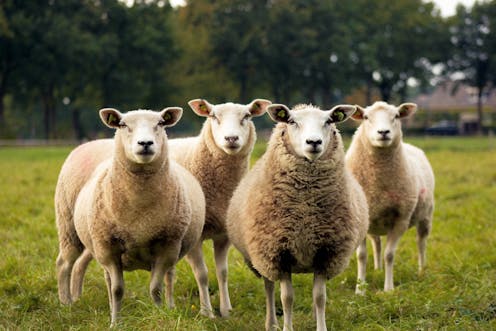What the High Court decision on filming animals in farms and abattoirs really means
- Written by Danielle Ireland-Piper, Associate Professor of Constitutional and International Law, Bond University

What do farm animals have to do with the Australian Constitution?
Should the public know what happens in abattoirs and farms? Do we have the right to publish footage of what happens to animals in slaughterhouses? Should governments be able to make laws criminalising it? How do we best protect the privacy of farmers and prevent trespass?
The High Court considered these issues in Farm Transparency v New South Wales[1], handing down its judgment this month. This case concerned sections 11 and 12 of the Surveillance Devices Act 2007 (NSW): section 11 prohibits the publication or communication of footage or photographs of “private activities”, including intensive farming and slaughtering operations, with penalties of up to five years in prison. Section 12 criminalises the possession of such recordings.
In 2015, Farm Transparency Project’s director, Chris Delforce, was charged[2] with publishing footage and photos depicting lawful practices at piggeries. The footage related to the use of carbon dioxide gas as a means of slaughtering animals.
While the charges were eventually dismissed, animal welfare organisations are concerned the legislation will obstruct legitimate whistleblowing (and public access to information) about the agricultural industry. There are also concerns the legislation may dampen the willingness of media to grapple with these issues. In turn, this may limit the ability of the Australian consumer to make informed choices about what they eat, and hinder public discussions about animal welfare due to a lack of information.
In that context, Farm Transparency took legal action arguing that the Surveillance Devices Act was in breach of the “freedom of political communication” implicitly protected by the Australian Constitution. In doing so, they turned an animal welfare and consumer rights issue into a constitutional issue.
Read more: Not just activists, 9 out of 10 people are concerned about animal welfare in Australian farming[3]
What is the implied freedom of political communication?
Australia, unlike all other western democracies, does not have a federal bill of rights. This means there is no stand-alone right to free expression or speech.
However, freedom of political communication is implied from sections 7 and 24 of the Australian Constitution, which require that elected representatives be “chosen by the people”.
The courts have held previously that this implies laws should not limit our communication on political matters because that influences our choice of representative. This means state or federal laws that disproportionately “burden” communication about political matters can be struck down as unconstitutional.
The High Court has repeatedly emphasised that the freedom of political communication is not absolute, nor is it a personal right. Rather, laws directed at a legitimate objective that are reasonable and adapted to that objective will still be valid.
In this case, the question before the court was whether the Surveillance Devices Act 2007 is “suitable”, “necessary” and “balanced”[4] in pursuing a legitimate objective. These questions have also been considered before by the court in relation to, for example, protesting, tweeting, political donations, bail conditions, and media reporting.
What did the High Court decide?
Four members of the court (Kiefel CJ, and Keane, Edelman, and Steward JJ) held that while the legislation did burden political communication, it also has a legitimate purpose of privacy. They also held that the offence provisions were proportionate to that purpose. Another judge (Gordon J) “read down” the reach of the provisions, which meant she thought they had limited scope and couldn’t be enforced to restrict publication of political communication.
Notably, two judges disagreed with the majority view (Gageler and Gleeson JJ), and found that the legislation was invalid. In their view, sections 11 and 12 impose blanket prohibitions and do so indiscriminately. In particular, Gageler J thought “The prohibitions are too blunt; their price is too high”.
However, ultimately the majority view was that sections 11 and 12 are constitutionally valid.
Of significance to those interested in animal welfare is that Kiefel CJ and Keane J accepted it was “a legitimate matter of governmental and political concern”. However, in their views, the relevant provisions in this case were not directed at restricting the content of the communications, but to the manner (such as trespass) in which they were obtained.
Read more: Can Labor's animal welfare plan improve Australia's lacklustre record?[5]
Why does this matter?
This decision means improved conditions for farm animals needs to be achieved by legislative and policy reform. Concerned consumers must convince parliaments to improve legal protections for non-human animals.
The issue is unlikely to go away. Animal welfare groups are increasingly concerned about standards of care and the manner in which animals are raised and slaughtered. Consumers are savvier in the information age and prefer choice.
The recognition of animal sentience and animal rights may eventually curtail the ability to engage in large-scale factory farming. This in turn will contribute to overall efforts to mitigate climate change[6] and other environmental effects.
There is also the overarching issue of the legal protection offered to whistleblowers[7] generally and the inherent problem in restricting information necessary for meaningful public debate.
Individuals and organisations do have legitimate expectations of privacy. However, disclosing reasonable concerns about conduct is an important tool in maintaining good governance and advancing accountability. Protections for whistleblowers are limited in Australia and there is space for legislative reform on this.
References
- ^ Farm Transparency v New South Wales (www.hcourt.gov.au)
- ^ was charged (www.sydneycriminallawyers.com.au)
- ^ Not just activists, 9 out of 10 people are concerned about animal welfare in Australian farming (theconversation.com)
- ^ “suitable”, “necessary” and “balanced” (journals.sagepub.com)
- ^ Can Labor's animal welfare plan improve Australia's lacklustre record? (theconversation.com)
- ^ mitigate climate change (journal.law.uq.edu.au)
- ^ whistleblowers (www.auspublaw.org)
















